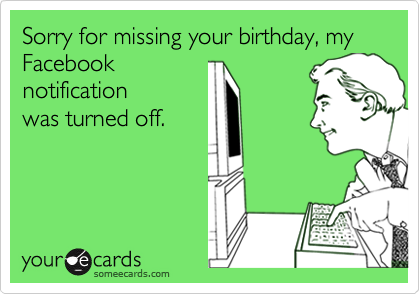My family is not really on Facebook much. They forgot my birthday.
This reminded me of traveling in the Yucatan as a 22-year-old and utterly forgetting my own birthday. Somehow the group I was with knew when it was even if I did not, and they actually engineered a makeshift surprise party for me. That was perhaps my most memorable birthday, though I’m not sure I would recognize any of those kind people if I bumped into them on the street today.
This year, I woke up late after having worked well into the morning on a collection of projects. As I spun up my email to check on things, my mailbox was stuffed with Facebook birthday wishes. That felt a little like the surprise party in the Yucatan.
The New York Times Opinionator had a thoughtful post about birthdays and Facebook. The author ends up essentially where I am, giving Facebook its due and marking its role here as basically positive.
Facebook’s power and pervasiveness is interesting, if a little scary. Why does it work so well? One of my colleagues has plausibly suggested that its phenomenal success is due in part to its essential emptiness. What she means by this is that the container—the platform—avoids giving too much direction for the user. It does not interfere with your ability to fill in your content, but it does provide a framework that is rigid and strong enough to keep the focus on the content and not the wrapper. These birthday wishes do not unfold from some customized envelope that the sender selects. They do not typically contain long or belabored messages. They simply appear in your email notifications and on your wall, and they all have exactly the same packaging with a short personalized message as text and an indication of who sent them. Only the essentials, nothing wasted.
Facebook’s strength is the ease with which it provides a means for people to do things they are naturally inclined to do, but might not if these acts were inconvenient or too much of a departure from their daily routine.
Facebook allows people to easily, almost passively—and with little guidance—interact with their friends. It subtly facilitates the pleasures of social engagement and self-expression in the warm context of a friendly audience. It does this with a kind of transparency—almost “invisibleness”—that makes it powerful. Its strength is the ease with which it provides a means for people to do things they are naturally inclined to do, but might not if these acts were inconvenient or too much of a departure from their daily routine. The Facebook birthday wish is a classic example. Who could remember everyone’s birthday? But the simple prompt in the sidebar makes it nearly effortless and still not devoid of meaning or genuine good intentions.
Facebook enables a kind of minimal-effort-required human communication that is, it seems, in sync with the warp and woof of people’s lives. It is inherently superficial for its ease—and lack of real social responsibility—but it IS real. I am thankful for those birthday wishes, and all the sundry notices that populate my news feed, each alerting me to some small facet of my friends’ lives. My own life would not afford this interaction otherwise.



Ask for help.
We are kind, thorough and ready when you are. You just need to ask.